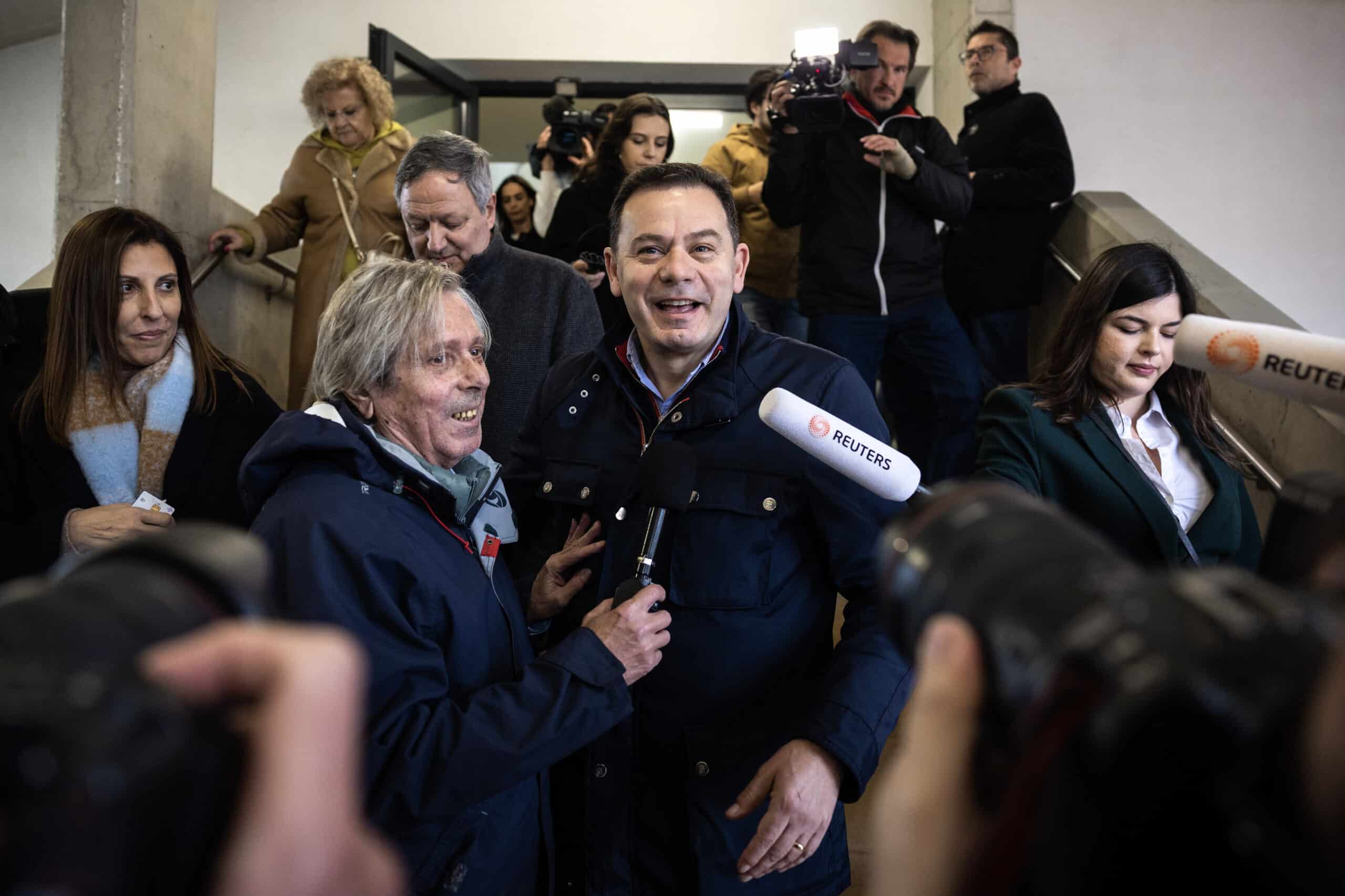But how will it work with CHEGA?
Exit polls early this evening showed Portugal appears to be ‘turning right’.
From the outset, the disillusion with PS Socialists was clear – but not clear enough for an absolute majority.
AD (Democratic Alliance of PSD/ CDS-PP/ PPM) may look to be ‘taking the night’, but even with the support of Iniciativa Liberal it is well short of the 116 seat majority it needs for a stable government.
“No means no”, AD’s PSD leader Luís Montenegro has said, time and again, about any kind of ‘pact’ with the ‘far right’ in the form of CHEGA. But results so far show citizens do not feel the same way.
Right at the first exit poll, CHEGA’s ‘massive gains’ have not only solidified the party’s position as Portugal’s third political force; they have made it the undeniable ‘kingmaker’: a stable government of the right in Portugal will find it almost impossible to exist without an agreement (of what kind we have to wait to find out) with CHEGA, according to the figures being discussed.
The early exit poll results were suggesting CHEGA could walk away this evening with between 44-54 MPs (the party currently has 12).
Arriving at his party’s base early this evening, CHEGA leader André Ventura stressed that CHEGA wants to be part of the solution for a stable government.
He said today’s votes show Portugal has moved from a biparty political system, to one dominated by three parties.
Ventura was the first ‘leader’ to address the press: early this evening AD’s Luís Montenegro and PS Socialists’ Pedro Nuno Santos were (quite literally) nowhere to be seen. They were certainly not talking to the press – both potentially hoping the exit polls were going to be proved wrong as the evening progressed.
As for the smaller parties, the polls don’t show any of them amassing enough support to bolster PS Socialists in any kind of ‘winning majority’. LIVRE so far is showing the best gains; CDU looks like losing at least one seat (having already lost many seats in the last election).
Speaking for PS Socialists, João Torres has given a ‘first reaction’ to all the news of political change. “In spite of not lamenting defeat, there is no singing of victory“, writes SIC Notícias. Everything is focused on what the rest of the night brings.
Certainly Ana Catarina Mendes – the outgoing minister for parliamentary affairs – has suggested “what is coming is not good for the Portuguese” – very much adhering to the message given throughout the political campaign by PS secretary general Pedro Nuno Santos that any government that is not Socialist in Portugal can only be a ‘step backwards’.
At 10.10pm news anchors were remarking that “generally speaking” party leaders would have spoken by now, either to celebrate their approaching victory, or lament a less than expected result. This still hasn’t happened. But this could also be largely because the ‘numbers’ are so ‘precarious’: the way results are going, PS Socialists with all the other parties throwing their weight into a left-wing coalition (LIVRE/ CDU/ Bloco de Esquerda/ PAN) would still be a long way short of the 116 MPs needed for a majority; AD (with a possibilty of up to 89 MPs even with IL (possibly as many as 12 MPs) could not reach 116 either – unless there is an agreement with CHEGA (MPs likely to exceed 44, minimum).
SIC’s Bento Rodrigues, assessing results as they come in, stresses that the only instant majority would be if AD and PS teamed up to form a ‘central bloc’: something that PS Socialists have always shied away from.
António Costa addresses journalists
With PS secretary general Pedro Nuno Santos still ‘nowhere to be seen’, outgoing prime minister António Costa has turned up at the PS election base in Lisbon to suggest the results this evening will not be conclusive. “We probably won’t know the result today”, he told reporters, describing the numbers as “almost final” but still “practically a tie; very close”.
According to Mr Costa, the votes from emigrés could swing tonight’s result to PS’ favour. But he conceded that “we can say two things” about this evening: the PS has had a “significant fall in the number of votes”, while AD has really made few strides in comparison to votes polled in the 2022 elections.
What has changed, said the PM, is the “very strong increase of CHEGA”.
“We need to analyse the rise of CHEGA”, he added – which in many ways goes without saying, but also cannot change CHEGA’s results.
With Costa having ‘popped the balloon’ in a way on hopes for a result this evening, all that remains is for AD leader Luís Montenegro to give his assessment of ‘where we are’, and what might happen tomorrow.
As of 11.45 pm: AD has 77 MPs already elected; PS Socialists have 74; CHEGA has 46, Iniciativa Liberal has 8, Bloco de Esquerda has 5, LIVRE has 4, CDU has 3, PAN has 1.
By ten minutes to midnight, the leaders of both main political forces (AD’s Luís Montenegro and PS’s Pedro Nuno Santos) had yet to speak/ address party faithful congregated in their respective election bases. Luís Montenegro however was imminently expected. In the meantime, seasoned political commentator Luís Marques Mendes has pointed out that the results are essentially leaving the country in “great fragility; enormous uncertainty”. In Marques Mendes’ mindset, Luís Montenegro’s ‘no means no’ to any agreements with CHEGA to viabilise a government cannot end up meaning ‘yes’, as this will show AD as being a coalition that does not keep its word.
More to come tomorrow when the results of Portugal’s legislative elections are unlikely to be completely settled.ND




















